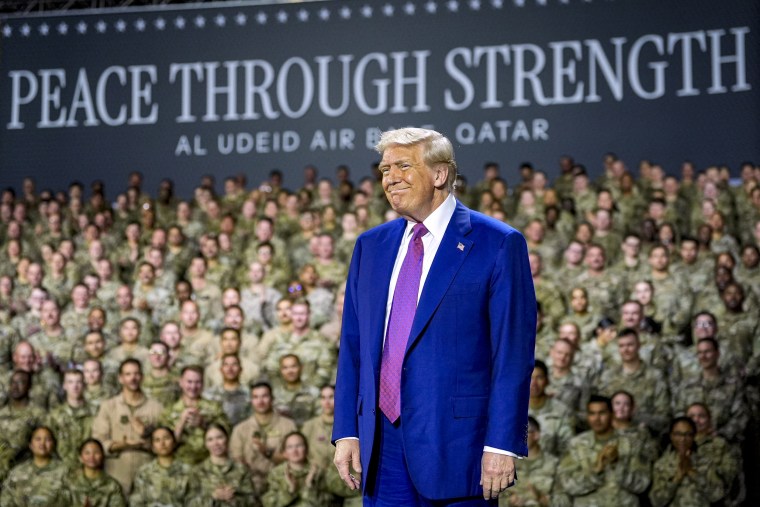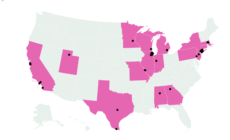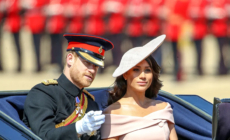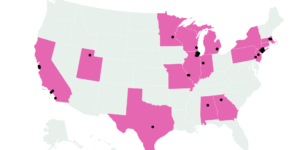-
What Owning a Dog Says About You, According to a Psychotherapist - 13 mins ago
-
Angels vs. Orioles Highlights | MLB on FOX - 31 mins ago
-
Map Shows the 50 Best School Districts Across US - 54 mins ago
-
Rays vs. Mets Highlights | MLB on FOX - about 1 hour ago
-
And Just Like That… Season 3 Episode 4 – Release Date, Schedule, How To Watch - 2 hours ago
-
Rockies vs. Braves Highlights | MLB on FOX - 2 hours ago
-
Summer Nostalgia at the Buda Castle Garden Bazaar - 2 hours ago
-
Washington Commanders Coach Delighted With Deebo Samuel - 2 hours ago
-
Sussexes not invited to Trooping the Colour as royals maintain distance: expert - 3 hours ago
-
Christian Rasmussen takes Will Buxton around the World Wide Technology Raceway - 3 hours ago
Views of the U.S. under Trump dip sharply in many allied countries
Views of the U.S. and confidence in its leader to handle world affairs have taken a dive in more than a dozen countries over the last year, according to a poll from the Pew Research Center released Wednesday and conducted over the first few months of President Donald Trump’s second term.
These declines are most pronounced among residents in neighboring Mexico and Canada, which have been at the center of high-profile spats with the administration, as well as a handful of NATO countries (like Sweden, Poland and the Netherlands) amid it Russia’s war with Ukraine.
Public sentiment about the U.S. has gone up in a few countries over the last year, most notably in Israel. But most of the two-dozen countries surveyed saw public opinion about the U.S. dip as Trump began his second term.
Overall, the poll shows an international community full of increased skepticism of Trump and his “America First” foreign policies, from his administration’s antagonistic relationship with traditional close allies to its focus on tariffs to its friendly posture toward right-wing, populist movements that have been amassing more power in Europe.
Yet while the results in many countries are negative, Trump’s marks are broadly higher this year in these nations than they were during the beginning of his first term eight years ago.
Fifteen countries have seen significant drops in their opinion of America over the last year. In Mexico, 61% of respondents had a favorable opinion of the U.S. in 2024, but just 29% feel that way this year.
In Sweden, which joined NATO in 2024 following the Russian invasion of Ukraine two years prior, a 47% favorable rating of the U.S. last year plummeted to just 19% this year, with 79% of Swedish respondents viewing America unfavorably.
And in Canada, a 54% favorability mark in 2024 dropped 20 points in 2025, to 34%, amid Trump’s repeated threats to make the country America’s newest state.
On the other end of the spectrum, the share of people in Turkey, Nigeria and Israel who rated the U.S. favorably increased significantly over the last year.
Pew polled 28,333 adults across 24 countries mostly over the phone or in person (Australia was the only country where people were polled online). The survey was in the field for various times across different countries between Jan. 8 and April 26. Polling in every country except Indonesia began after Trump’s inauguration, but was either concluded or close to done by Trump’s April 2 announcement of sweeping international tariffs.
When it comes to Trump specifically, a majority of respondents in five countries of the 24 surveyed said they have a lot or some confidence in the president to do the right thing when it comes to world affairs: Hungary, India, Israel, Nigeria and Kenya. Majorities in nine of the 10 European countries tested have either not too much or no confidence in Trump at all, with at least three-quarters of respondents saying so in the Netherlands, France, Spain, Germany and Sweden.
Men, younger people and those who view their country’s right-wing populist parties favorably are more likely to have more confidence in Trump.
For example, 51% of Japanese people between the ages of 18 and 34 have confidence in Trump, according to the poll, while 31% of Japanese people 50 years or older say the same.
In the United Kingdom, 45% of men say they have confidence in Trump, compared with 28% of women.
Respondents across 13 nations registered a double-digit decline in confidence in the U.S. president on world affairs between 2024 and 2025. While 63% in both Sweden and Germany had confidence in then-President Joe Biden last year, just 15% and 18%, respectively, said they have confidence in Trump.
The survey also tested how well respondents felt several different personal characteristics described Trump. At least 60% of adults across 21 of the 24 countries surveyed said the word “arrogant” described Trump well.
Majorities in 20 countries said he’s “a strong leader,” while majorities in 21 countries called him “dangerous.”
Majorities in three countries (Nigeria, India and Kenya) said Trump was “honest,” and majorities in five countries (Greece, Japan, Indonesia, Hungary and Kenya) called him “diplomatic.”

Compared with his first term, the share of people across most of the surveyed countries who see Trump as a strong leader and qualified has increased. There has also been a dramatic increase in the share of adults who believe America’s president is “dangerous” in countries where Pew also tested Biden’s first year in office.
On confidence in Trump to tackle global economic problems, Trump is underwater in every European country surveyed, though Hungarians are effectively split. The survey was mostly conducted before Trump announced global tariffs on April 2.
In Mexico, where the survey was conducted following weeks of changing tariff policies on the country, 83% lack confidence in Trump’s economic policies. In Canada, which has faced similar targeting from Trump, 74% lack confidence, and 57% said they have no confidence at all.
Majorities in three countries — Kenya (56%) and Nigeria and Israel (62% each) — have confidence in Trump to handle “the conflict between Israel and its neighbors.” His numbers among the countries tested are the lowest in Turkey, where 7% are confident in his handling of the issue.
Though a majority of Israelis expressed confidence in Trump’s ability to handle the ongoing war, the poll found that confidence in Trump among right-wing Israelis is nearly four times higher, at 83%, compared with the 21% of left-wing Israelis who have confidence in Trump on the issue. Adults in most other countries said they were not confident in Trump’s ability to handle the conflict.
On Trump’s handling of the Russia-Ukraine war, majorities in nearly all of the European countries surveyed, with the exception of Greece and Hungary, expressed little or no confidence in Trump. (Adults in Greece were split, and a narrow majority of Hungarians had at least some confidence in Trump to handle that conflict.) In France, Germany, Spain and Sweden, about three-quarters of adults said they had little or no confidence in Trump to handle the war.
Source link































